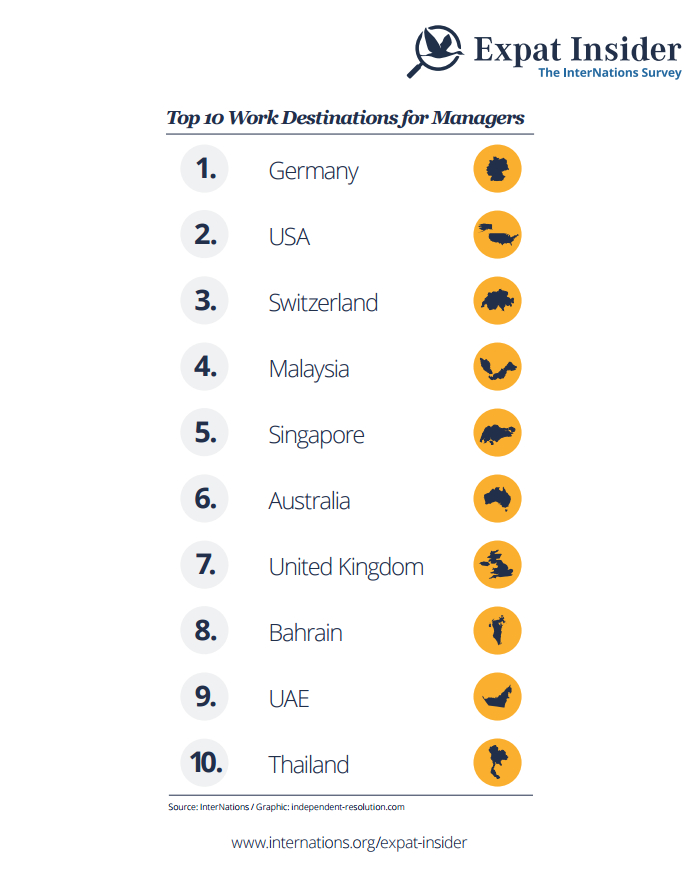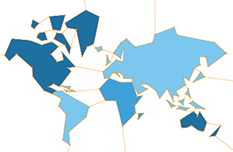Expat Managers around the World
Managers are much more likely to receive relocation support than the average expatriate who relocated for their career. The majority also earns more than they did back home.
Expats who stated that they are in an employment situation were also asked about their level of seniority within the company. This section takes a look at those expats who say they are in a middle or top management position.
Compared to the general survey population which is divided fairly evenly between men (47%) and women (53%), a much higher percentage of men have middle or top management positions than women (64% vs. 36%). Managers are on average slightly older than the overall average (41.8 vs. 40.9 years). They are also more likely to have dependent children living abroad with them than the general survey population (26% vs. 21%). Managers are noticeably less likely to say they will possibly stay in their host country forever (18%, compared to a general average of 25%). For this group, a stay of one to three years is the option with the highest percentage (22%).
Top Countries 2015

Sent Abroad for Work
The highest percentage of middle and top managers was sent abroad by their employer (31%), compared to an average of 13% among the general survey population who listed this as their most important reason for moving abroad. Twice as many managers were recruited by a local company (8% vs. 4%) and a slightly higher percentage found a job in their host country on their own (16% vs. 13%). Expats in management positions are much less likely to move abroad in order to follow a partner or spouse. Half the general average moved for love (5% vs. 10%) and only a third of the total average relocated for their partner's job or education (3% vs. 9%).
Benefiting from Relocation Support
Managers who moved abroad for job-related reasons are more likely to get relocation support from their employer. In fact, while across the survey 15% of those who went abroad for a job say they got no relocation support at all, among managers, this percentage is just 8%. A high 59% of managers had their company help pay for their relocation. Only 48% of all survey participants who relocated for job-related reasons can say the same. An even higher percentage (78%) had help with getting a visa or residence/work permit, compared to 67% among all respondents who relocated for their career.
Managers Abroad: Work & Money
Almost all managers in the survey work full-time (98% vs. 86% among all respondents). Managers work significantly longer hours than the overall average. Among these 98% who work full-time, their average working week consists of 47.6 hours, compared to the general average of 44.9. Despite longer working hours, these expat managers are only slightly less satisfied in this regard. Six in ten are generally satisfied with their working hours, compared to 62% among the general survey population.
There is also not a big difference in terms of satisfaction with work-life balance. Whereas 59% of managers are generally satisfied with this factor, 61% of all expats are. A bigger difference comes to light for overall job satisfaction, where 71% of managers express general satisfaction with their jobs (general average: 64%).
Among managers, almost twice as many as the general average work in manufacturing or consumer goods (13% vs. 7%). A considerably lower percentage of managers work in education, research, or translation than the overall average (8% vs. 17%).
Compared to all survey participants, managers are somewhat more likely to say they are now earning more than they did back home (63% vs. 56%). They are also more likely to have a household income that is higher than the local average (77% vs. 60%), and 38% (vs. 25%) even have a household income that is significantly above the average local income.
Over eight in ten managers (82%) chose to answer the optional question about their actual household income. The results show that managers are much more likely to fall into the top income groups, with 43% having a yearly gross household income of 100,000 USD or more. Twice as many as the overall average even have an income of 250,000 USD or more per year (7% vs. 3%).
Countries Ranked by Managers
In the survey, 26 countries have enough expats working in top and middle management to yield statistically significant results. Of these 26 countries, managers rank Singapore the highest in general, followed by Malaysia, the USA, Australia, and Bahrain. More specifically, managers are the most satisfied with the working conditions in Germany, followed by the USA, Switzerland, Malaysia, and Singapore, which emerge as the top countries from the Working Abroad Index when rated by managers only.
Further Reading
- Expat Insider 2015 - Expats and the Support They Receive
- Expatriate Benefits: Perks of an Expat Job
- 10 Tips for Leading a Multicultural Team
- 10 Tips on Being an Effective Global Leader
- Applying for a Career Overseas
- International Etiquette for Businesspeople
- Our Complete Expat Guide to Working Abroad



